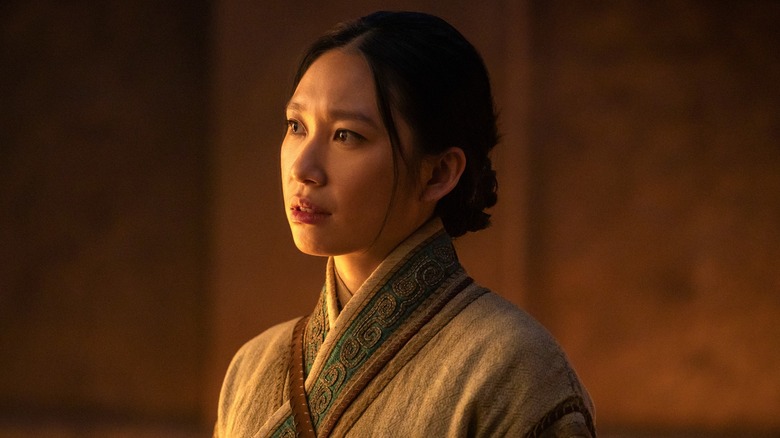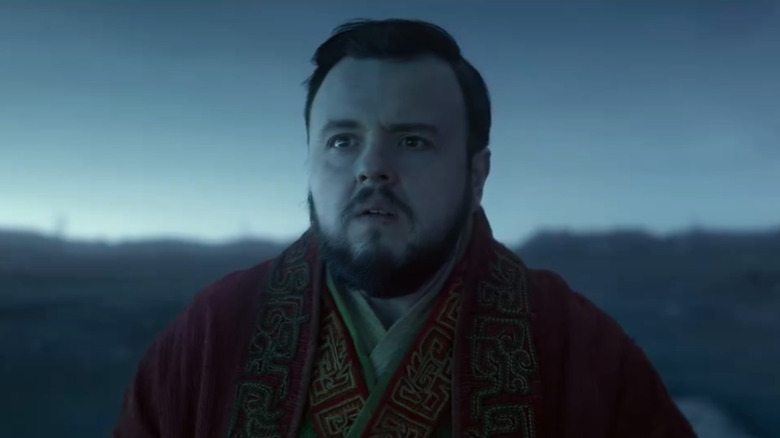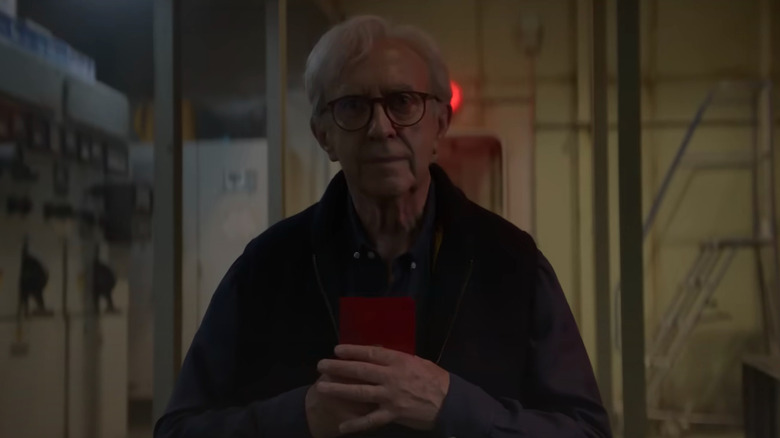3 Body Problem Wants To Be Netflix's Game Of Thrones - And That Could Ruin It
Netflix's "3 Body Problem" delivers the high-concept thrills its trailers already teased. Mysterious floating numbers that seem to kill scientists, the messed-up truth of Mao Zedong's Cultural Revolution, mysterious VR headsets, and shadowy organizations all play a part in the plot of the "Game of Thrones" creators' sci-fi series — but the show has another side, too. Even if you didn't remember that David Benioff and D.B. Weiss are behind "3 Body Problem," you might notice that the show features a strange number of "Game of Thrones"-style elements ... to the point where it starts to be distracting.
The vague familiar feeling starts in the very first episode. The intro sequence features characteristically epic, swooping music by Ramin Djawadi — who also composed the theme for "Game of Thrones" — and big interstellar graphics that move from location to location, not unlike the iconic "Game of Thrones" intro. After that, the show keeps introducing well-known "Game of Thrones" actors at regular intervals, almost as if to ensure that something Westeros-adjacent will pop up to better connect "3 Body Problem" with HBO's fantasy smash hit.
The show even opens with a big, bloody public execution set in the past, and features a creepy eyeless corpse which reminds the viewer of Oberyn Martell's (Pedro Pascal) grim fate. As it is, by the end of the series premiere the viewer would be forgiven for expecting Jon Snow (Kit Harington) to make a mid-credits appearance.
The Game of Thrones actors' roles seem awfully familiar
"3 Body Problem" uses multiple actors from "Game of Thrones," all three of whom seem to be playing roles that are contemporary versions of their "Game of Thrones" characters.
John Bradley plays Jack Rooney, a brilliant scientific mind who uses his talents to make money. This puts him in an outcast scholar position that isn't all that dissimilar from Samwell Tarly, a bookish nobleman who joins the Night's Watch after his family disowns him. In an interview with Vulture, Bradley revealed that David Benioff and D.B. Weiss specifically wanted him to play Jack, since the character is closer to the actor's real personality than Sam. "There are similarities between Sam and Jack in terms of intelligence and natural curiosity," he said. "But Jack's just got confidence in his own opinions and what he believes to be true."
The two other "Game of Thrones" actors are Liam Cunningham and Jonathan Pryce. Cunningham plays Thomas Wade, a spymaster who seems to be wielding similar power as a Hand of the King in "Game of Thrones" — a position Davos Seaworth just so happened to hold. Pryce's Mike Evans is an influential figure within the show's mysterious game and may be in league with extraterrestrial beings. Combine this with the trailers' images of him kneeling on the floor and clutching a small red book as if in prayer, and it's easy to remember his "Game of Thrones" role as High Sparrow, a powerful zealot.
The Game of Thrones connections are understandable but they can be distracting
It's entirely possible that this isn't about David Benioff and D.B. Weiss either lazily reaching into their usual bag of tricks or cynically invoking memories of their smash hit show. Many creators simply like to work with people they know. Keeping this in mind, why wouldn't Benioff and Weiss go back to the composer behind the iconic "Game of Thrones" theme? Why wouldn't they cast John Bradley and Liam Cunningham, two actors who did a great job portraying two of the best and least evil "Game of Thrones" characters? Or Jonathan Pryce, an Academy Award-nominated acting legend who can play anything from a James Bond villain to a pope?
Individually, all these things make perfect sense. It's just that when the show is specifically advertised as the latest effort from the "Game of Thrones" creators, it's weird to see actual "Game of Thrones" references scattered throughout, no matter how coincidental they may be. This can be doubly jarring when you remember that "3 Body Problem" is a very different show from "Game of Thrones" — a contemporary large-scale science fiction mystery that unfolds slowly across multiple timelines. Here's hoping that the Netflix show proves compelling enough to shed the traces of Benioff and Weiss' earlier show from its back ... and that at the very least, it'll eventually get a better ending than "Game of Thrones."


